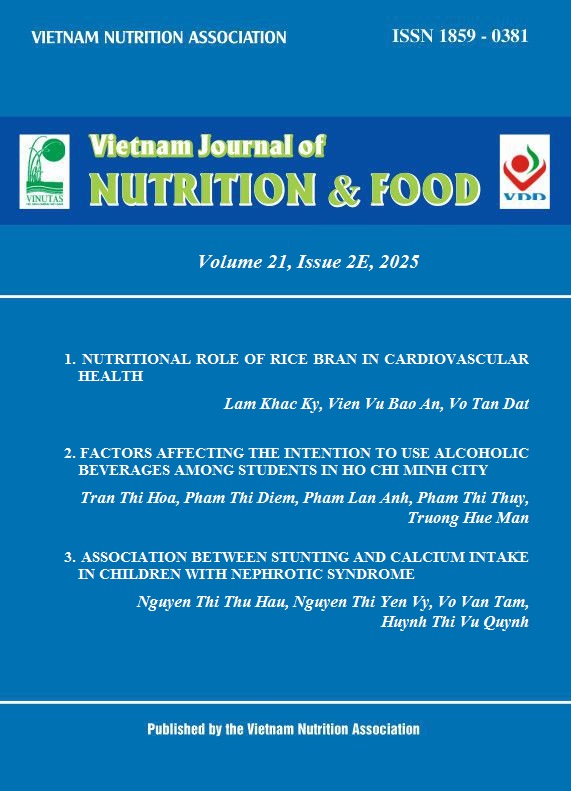FACTORS AFFECTING THE INTENTION TO USE ALCOHOLIC BEVERAGES AMONG STUDENTS IN HO CHI MINH CITY
Nội dung chính của bài viết
Tóm tắt
Aims: To determine the factors affecting the intention to use alcoholic beverages of students in Ho Chi Minh City, thereby providing a basis for intervention programs to reduce this behavior.
Method: Using qualitative methods through expert interviews and quantitative methods through exploratory factor analysis (EFA) and linear regression, the study collected data from 252 students from universities and colleges in the city using the convenience sampling method.
Results: There were four main factors affecting the intention to use alcoholic beverages: attitude about the benefits of using alcoholic beverages, social environment, attitude about the harms of alcoholic beverages, and availability of alcoholic beverages. Of which, attitude about the benefits of alcoholic beverages had the strongest influence (β = 0.371).
Conclusion: The study recommends strengthening supervision, management, social activities and psychological support to reduce students' intention to use alcoholic beverages, contributing to raising awareness and limiting negative consequences.
Từ khóa
Thức uống có cồn, sử dụng thức uống có cồn, thái độ về lợi ích, sự sẵn có của thức uống có cồn.
Chi tiết bài viết
Tài liệu tham khảo
2. Kirin Holdings Company (2021). Global beer consumption by volume in 2021. Retrieved from https://www.kirinholdings.com/en/newsroom/release/2023/1222_04.html
3. Euromonitor International (2019). Beer consumption in Asia by volume. Retrieved from https://www.statista.com/outlook/cmo/alcoholic-drinks/beer/asia
4. Lachenmeier DW, Anh PT, Popova S, Rehm J. The quality of alcohol products in Vietnam and its implications for public health. Int J Environ Res Public Health. 2009;6(8):2090-101. doi: 10.3390/ijerph6082090.
5. Vietnam Traffic Police Department. (2019). Traffic accidents and alcohol-related violations in Vietnam. Ministry of Public Security, Vietnam. https://e.vnexpress.net/news/news/traffic/vietnam-records-1-200-dui-violations-over-national-day-holiday-4789092.html
6. Loyola University Chicago (2018). Long-term health risks of alcohol consumption during adolescence. Journal of Adolescent Health Research. https://www.mcleanhospital.org/essential/drinking-teen-brain
7. Ajzen I, & Fishbein M. Understanding attitudes and predicting social behavior. Englewood Cliffs, NJ: Prentice-Hall. 1980. https://www.scienceopen.com/book?vid=c20c4174-d8dc-428d-b352-280b05eacdf7
8. Perkins HW. Social norms and the prevention of alcohol misuse in collegiate contexts. J Stud Alcohol Suppl. 2002;(14):164-172. doi: 10.15288/jsas.2002.s14.164.
9. Gruenewald PJ, Ponicki WR, Holder HD. The relationship of outlet densities to alcohol consumption: a time series cross-sectional analysis. Alcohol Clin Exp Res. 1993;17(1):38-47. doi: 10.1111/j.1530-0277.1993.tb00723.x.
10. Rabow J, Watts RK. The role of alcohol availability in alcohol consumption and alcohol problems. Recent Dev Alcohol. 1983;1:285-302. doi:10.1007/978-1-4613-3617-4_17.
11. Nguyen Dinh Tho. (2011). Analyzing research data with SPSS. Statistics. From https://www.researchgate.net/publication/382427638_Analyzing_the_Internal_Control_at_Nha_Trang_University_Case_Study_of_Using_Dummy_Variables_in_the_OLS_Regression_Model
12. Ha DT, Rungrat S & Wannipa A. (2012). The influence of attitudes towards alcohol consumption on drinking behavior of university students. Journal of Social Psychology from https://pubmed.ncbi.nlm.nih.gov/2609009/
13. Diep PB, Knibbe RA, Giang KB, De Vries N. Alcohol-related harm among university students in Hanoi, Vietnam. Glob Health Action. 2013;6:1-10. doi: 10.3402/gha.v6i0.18857.
14. Svatošová, V., Petráková, I., & Dvořáková, J. (2021). The relationship between alcohol consumption attitudes and behaviors in European adults: A cross-cultural study. International Journal of Addiction Studies. From https://europa.eu/eurobarometer/surveys/detail/798.


